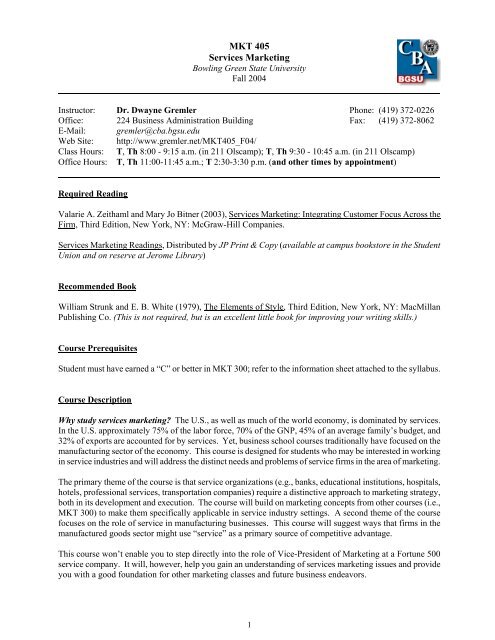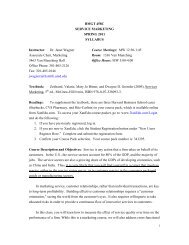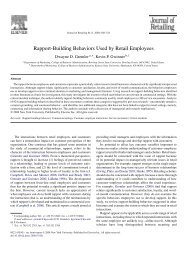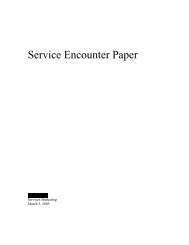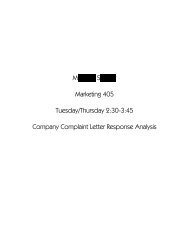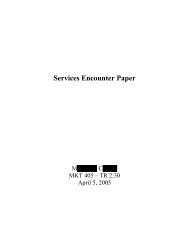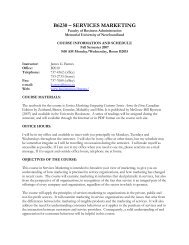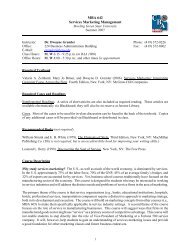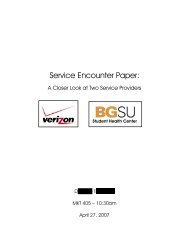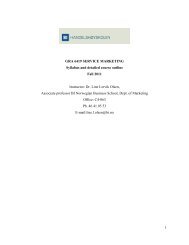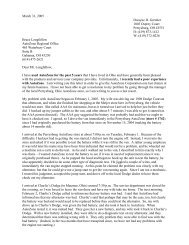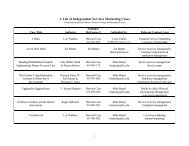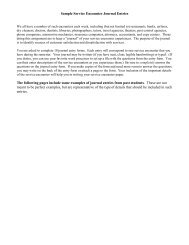a PDF file of this semester's Course Syllabus - Gremler.net
a PDF file of this semester's Course Syllabus - Gremler.net
a PDF file of this semester's Course Syllabus - Gremler.net
Create successful ePaper yourself
Turn your PDF publications into a flip-book with our unique Google optimized e-Paper software.
MKT 405Services MarketingBowling Green State UniversityFall 2004Instructor: Dr. Dwayne <strong>Gremler</strong> Phone: (419) 372-0226Office: 224 Business Administration Building Fax: (419) 372-8062E-Mail: gremler@cba.bgsu.eduWeb Site: http://www.gremler.<strong>net</strong>/MKT405_F04/Class Hours: T, Th 8:00 - 9:15 a.m. (in 211 Olscamp); T, Th 9:30 - 10:45 a.m. (in 211 Olscamp)Office Hours: T, Th 11:00-11:45 a.m.; T 2:30-3:30 p.m. (and other times by appointment)Required ReadingValarie A. Zeithaml and Mary Jo Bitner (2003), Services Marketing: Integrating Customer Focus Across theFirm, Third Edition, New York, NY: McGraw-Hill Companies.Services Marketing Readings, Distributed by JP Print & Copy (available at campus bookstore in the StudentUnion and on reserve at Jerome Library)Recommended BookWilliam Strunk and E. B. White (1979), The Elements <strong>of</strong> Style, Third Edition, New York, NY: MacMillanPublishing Co. (This is not required, but is an excellent little book for improving your writing skills.)<strong>Course</strong> PrerequisitesStudent must have earned a “C” or better in MKT 300; refer to the information sheet attached to the syllabus.<strong>Course</strong> DescriptionWhy study services marketing? The U.S., as well as much <strong>of</strong> the world economy, is dominated by services.In the U.S. approximately 75% <strong>of</strong> the labor force, 70% <strong>of</strong> the GNP, 45% <strong>of</strong> an average family’s budget, and32% <strong>of</strong> exports are accounted for by services. Yet, business school courses traditionally have focused on themanufacturing sector <strong>of</strong> the economy. This course is designed for students who may be interested in workingin service industries and will address the distinct needs and problems <strong>of</strong> service firms in the area <strong>of</strong> marketing.The primary theme <strong>of</strong> the course is that service organizations (e.g., banks, educational institutions, hospitals,hotels, pr<strong>of</strong>essional services, transportation companies) require a distinctive approach to marketing strategy,both in its development and execution. The course will build on marketing concepts from other courses (i.e.,MKT 300) to make them specifically applicable in service industry settings. A second theme <strong>of</strong> the coursefocuses on the role <strong>of</strong> service in manufacturing businesses. This course will suggest ways that firms in themanufactured goods sector might use “service” as a primary source <strong>of</strong> competitive advantage.This course won’t enable you to step directly into the role <strong>of</strong> Vice-President <strong>of</strong> Marketing at a Fortune 500service company. It will, however, help you gain an understanding <strong>of</strong> services marketing issues and provideyou with a good foundation for other marketing classes and future business endeavors.1
<strong>Course</strong> ObjectivesThe intent <strong>of</strong> <strong>this</strong> course is to introduce, discuss, and analyze several topics important to service businesses.After completing <strong>this</strong> course, students should be able to:# Understand the unique challenges involved in marketing and managing services.# Identify differences between marketing in service versus manufacturing organizations andunderstand how “service” can be a competitive advantage in manufacturing organizations.# Identify and analyze the various components <strong>of</strong> the “services marketing mix” (three additional P’s)as well as key issues required in managing service quality.# Appreciate the role <strong>of</strong> employees (and <strong>of</strong>ten customers) in service delivery, customer satisfaction,and service recovery.# Appreciate other key issues in service businesses, such as managing supply and demand, theoverlap in marketing/operations/human resource systems, and relationship management.# Build upon important workplace skills (e.g., cooperation, teamwork, meeting deadlines, reportwriting) through active learning activities and other classroom exercises.# Become better, more aware, and maybe less naive services consumers.# Enjoy themselves while accomplishing all <strong>of</strong> the above.Additionally, the course assignments are designed to continue to improve students’ verbal, written, andthinking skills in preparing them for positions in the business world.Instructor Expectations <strong>of</strong> StudentsA goal for the classroom is to have a positive, attentive, courteous environment that is conducive to learning.Being on time, being alert, participating in discussion and activities, staying for the full class time, andgenerally contributing to the learning experience <strong>of</strong> one’s classmates are desirable behaviors. Class will bea combination <strong>of</strong> instructor lectures, interactive class discussions, and in-class activities. You will be requiredto complete assigned readings prior to class sessions during which those readings are examined. Assignmentsare due in class at the beginning <strong>of</strong> class on the specified due date.Students are expected to conduct themselves pr<strong>of</strong>essionally in all matters related to <strong>this</strong> class. This means youshould act pr<strong>of</strong>essionally while in class and prepare all assignments in a pr<strong>of</strong>essional manner. To illustrate:• Inappropriate verbal comments directed toward others in class will not be tolerated.• Cell phones and pagers should be turned <strong>of</strong>f during class. In an emergency situation, please letme know before class that your phone or pager may go <strong>of</strong>f.• Unless otherwise noted, the major written assignments should be typed or word-processed and free<strong>of</strong> spelling and grammatical errors.• Cheating <strong>of</strong> any type will not be tolerated. I consider plagiarism to be a form <strong>of</strong> cheating. If youare unsure what constitutes plagiarism, please see me. Any assignment containing plagiarizedmaterial will receive a grade <strong>of</strong> zero.Historically I have asked students if the expectations listed above seem reasonable, and they nearly always sayyes. So, if you have a problem with one <strong>of</strong> these issues, please let me know immediately.2
<strong>Course</strong> RequirementsYou will be expected to participate in several different activities in <strong>this</strong> course. Your final grade is based ona portfolio <strong>of</strong> work which assesses your effort and understanding using a variety <strong>of</strong> learning methods. Inparticular, your grade in <strong>this</strong> class will (tentatively) be determined based upon the components listed in thefollowing paragraphs. Students should keep track <strong>of</strong> their own points throughout the semester. A detailedbreak-down <strong>of</strong> each category is provided on the Point Portfolio page near the end <strong>of</strong> the syllabus to help youmonitor your progress.ExamsTwo exams will be given in <strong>this</strong> class. The exams will cover material from the textbook, activelearning assignments, and in-class discussions. Exams will be essay. Due to copying and schedulingconsiderations, any request to change an exam time for a valid reason must be approved by theinstructor at least two weeks in advance. All students will be expected to take the exams at thefollowing scheduled times:Exam 1 Week <strong>of</strong> October 5 (specific date, time, and format to be announced)Exam 2 Week <strong>of</strong> December 13 (specific date, time, and format to be announced)Students who do not take an exam at the scheduled time and have not made prior arrangements willbe required to take an alternate (comprehensive) exam on Friday, December 17, at 3:30-5:30 p.m.Generally speaking, makeup exams tend to be more difficult than the regularly scheduled exams.I will do my best to return your exams to you within a couple <strong>of</strong> (class) days. I will not discussindividual exam scores or questions in the classroom. I will only discuss questions on a particularstudent’s exam after the student has submitted, in writing or via E-mail, a statement describing whythe score on a particular question (or questions) should be re-evaluated. After the exam has beenreturned to the class, you will have three class days to turn in a written appeal if you disagree with myevaluation <strong>of</strong> a particular question or questions.Student Co-production (In-Class Participation)To assist in your understanding <strong>of</strong> services marketing issues, you are encouraged to contribute to inclassdiscussions. Your participation and interaction with other students, as well as thepr<strong>of</strong>essionalism you display in all aspects <strong>of</strong> <strong>this</strong> class, will be a major component <strong>of</strong> the classinstruction. Your co-production may also be based upon your ability to recognize contemporaryservices marketing issues. You are encouraged to examine current issues and to bring in articles forclass discussion. In so doing, you should be prepared to describe the relevance <strong>of</strong> the article toservices marketing.This educational “service” (MKT 405) requires your active co-production and participation in theclassroom for it to be a success. Your attendance in class is a necessary, but not sufficient, conditionfor good participation. (Merely showing up for work, but not contributing anything to theorganization, would not generally be considered acceptable behavior in the workplace.)In a departure from usual practice, at the end <strong>of</strong> the semester you will evaluate your own co-production(participation) and assign yourself a score. As part <strong>of</strong> <strong>this</strong> process you will be required to submit aone-page justification <strong>of</strong> the grade you have given yourself. So, I would advise you to keep track <strong>of</strong>days/topics where you believe you have taken an especially active, leadership role in class discussion.I will provide you with guidelines (on the course web site) as to how you should evaluate your ownco-production (participation) in the course assignments document. (I reserve the right to adjust thefinal co-production grade if I deem it necessary.)5
Individual AssignmentDuring the semester you will are required to complete one <strong>of</strong> the following two individualassignments. (You will be allowed to select whichever assignment you prefer.)Company Complaint Letter Response Analysis. Each student in the class will be required to write aletter <strong>of</strong> complaint to an organization from which the student has had a less-than-satisfactoryexperience with the company’s service <strong>of</strong>fering. Students choosing <strong>this</strong> assignment will, near the end<strong>of</strong> the semester, analyze the response they received from their complaint))or the lack there<strong>of</strong>. Detailsare provided in a separate handout.Service Encounter Journal Paper. Each student in the class will also be required to record 10 “journal”entries concerning service encounters that he/she experiences during the first few weeks <strong>of</strong> thesemester. (A form will be provided for the journal entries.) Students choosing <strong>this</strong> assignment will,near the end <strong>of</strong> the semester, write a paper analyzing their best and worst service encounterexperiences. Details are provided in a separate handout.Team AssignmentMini-ProjectsDuring the semester you will be assigned to a team <strong>of</strong> four or five students. Each team will beresponsible for completing the marketing project assignment listed below.Service Blueprint. This assignment requires students to construct a detailed service blueprint for aparticular service provider and, perhaps, present it to the class. The assignment will also involvewriting a short paper discussing how the blueprint might be used to improve marketing and operationsin the organization. Additional details <strong>of</strong> the assignment are provided in a separate handout.During the semester you will be required to complete a variety <strong>of</strong> small “mini-projects.” Theseprojects are designed to provide students with opportunities to supplement their classroom learningexperience. Student participation in these assignments is essential to the learning process. Each miniprojectwill be worth between 10 and 50 points. Four assignments included in <strong>this</strong> set are:• Complaint Letter & Online Complaint Registration• Praise Letter• Service Encounter Journal• Mystery Shopping/Marketing ResearchOther activities that may be assigned as the semester unfolds include: case analyses, Inter<strong>net</strong> exercises,marketing research projects, analyses <strong>of</strong> collected materials, or other projects. Additional details <strong>of</strong>these assignments will be provided in a separate handout.Active Learning Assignments/QuizzesActive Learning Assignments. From time to time we will have in-class active learning activities. Forthese activities teams will be assigned, and as a team you will be required to complete a particularactivity. Active student participation in these assignments is essential to the learning process. Eachactive learning assignment is worth 5-15 points. You must be present in class on the day <strong>of</strong> theassignment in order to receive any credit for that assignment. Thus, if you are not present in class fora particular active learning assignment, you will receive 0 points. These activities may include minicaseanalyses, exercises, “marketing consulting” projects, analyses <strong>of</strong> collected materials, or smallgroupdiscussions. Your enthusiasm and cooperation in participating in these activities will assist inyour understanding <strong>of</strong> the marketing topics we will cover.6
Active Learning Assignments/Quizzes (continued)Quizzes. Sometimes students need an incentive to prepare in advance for class (e.g., read the textbook) and arrive for class on-time. Thus, from time to time, I may give unannounced, short quizzes(usually 5-10 points) on the assigned reading material (including articles and/or cases). My intent isto encourage you to keep up on your reading assignments and to see if you are synthesizing thematerial. The most likely time for a quiz will be the beginning <strong>of</strong> class. If you are not in class at thetime <strong>of</strong> the quiz, you will receive 0 points.NOTE: You must be in class at the time the quiz is distributed in order to take the quiz.(In other words, late arrivals will not be given a quiz.)Other Important InformationSuccess-Oriented <strong>Course</strong>. MKT 405 is a success-oriented course. My desire is that all students in the classmeet their individual learning (and grade) goals. However, <strong>this</strong> does not mean that you can avoid workinghard in <strong>this</strong> class. What <strong>this</strong> does mean is that all students who do well in the class will be rewardedaccordingly. That is, the grade distribution will not be adjusted to make sure it fits a bell-shaped curve))thus,you are not in direct competition with your classmates. Also, you will have many assignments to help youdemonstrate your understanding <strong>of</strong> the material we cover in class. The exam points comprise only a portion<strong>of</strong> your grade because in the business world other skills are as important as knowledge. You are given otherassignments (besides exams) to encourage the development <strong>of</strong> these skills as well.Study Time. Most college courses require students to spend a significant amount <strong>of</strong> time outside <strong>of</strong> class inindividual study time. A general guideline is that at least two hours should be spent studying outside <strong>of</strong> classfor every one hour spent in class. Actual in-class meeting time is short in college courses because studentsare expected to work independently outside <strong>of</strong> class in order to meet the course requirements. My experiencesuggests that students who regularly spend <strong>this</strong> amount <strong>of</strong> time each week in preparing for <strong>this</strong> class tend todo very well, assuming they make effective use <strong>of</strong> their time.Class Pace. Much time is allocated in <strong>this</strong> class for small group discussion and in-class activities. As a result,not as much time is spent in the traditional lecture format. In order to cover the course material, lectures areorganized to cover the material at a fairly quick pace. It is, therefore, essential that you (a) keep up with theassigned readings, (b) budget your time wisely in order to complete all <strong>of</strong> your assignments, and (c) seekclarification on any material that you do not understand. If I start going too fast in my lectures, let me know.It is my desire that you understand the material.Flexibility. A tentative schedule for the entire semester is included in <strong>this</strong> syllabus. Although much thoughtwas put into the course schedule listed in <strong>this</strong> syllabus, the schedule is tentative and subject to change asnecessary because <strong>of</strong> the availability <strong>of</strong> guest speakers and/or support materials, or in order to adapt to specificneeds <strong>of</strong> the class. Occasional departures from the schedule, such as additional readings, assignments, andactivities, may be announced in class during the semester. Such announcements will take priority over theprinted schedule. It is the student’s responsibility to be in class and keep up-to-date on whatever changes aremade in the schedule.Active Learning Activities. Active learning methods are frequently used in <strong>this</strong> class. This means you willbe part <strong>of</strong> a group in which you will work together to complete a number <strong>of</strong> assignments. It has beenrepeatedly demonstrated that active learning results in higher grades, increased critical thinking skills, positiverelationships, deeper level understanding, and much more. In addition, student evaluations <strong>of</strong> such classesshow that most students enjoy the active role they play in the class, have fun in the process, learn more, takeresponsibility for their own learning and the learning <strong>of</strong> others, and develop meaningful friendships whichencourage them in their studies and in their personal lives.7
Evaluation <strong>of</strong> Assignments. Several written assignments are made in <strong>this</strong> course. Specific guidelines areprovided and will need to be followed. These assignments will also be graded for grammar. Students shouldexpect to do fairly well if all <strong>of</strong> the instructions are followed. However, if only some <strong>of</strong> the instructions arefollowed, then only some <strong>of</strong> the possible points will be awarded. Active learning team activities will also beevaluated based on how well the instructions are followed and the thoroughness <strong>of</strong> the answers.Academic Dishonesty. University policy and the BGSU Student Handbook indicates that academic honestyviolations (e.g., cheating, fabrication, facilitating academic dishonesty, plagiarism, as well as collaboratingwith fellow students on exams and individual assignments and having access to unauthorized material) requiresthe instructor to fail the <strong>of</strong>fender(s) for the course. If serious enough, any such situation will be handed overto university authorities for further action.Emergency Communication. Occasionally situations occur where there is a question as to whether a class willbe held or not (heavy snowfall, icy roads, floods, instructor illness, etc.). Should the university or theinstructor decide to cancel classes, an announcement will be sent via e-mail to all students on the <strong>of</strong>ficial classroster using your BGNET e-mail address. Thus, when in doubt about whether or not there will be a class,assume that class will be held unless an e-mail message from the instructor indicates otherwise.Classroom Behavior. Some miscellaneous expectations that I (as the service provider) have <strong>of</strong> you (thecustomer) in the delivery (co-production) <strong>of</strong> <strong>this</strong> educational service:Do not hesitate to ask questions. If something is unclear to you, it probably means that several othershave the same question. However, please ask me the questions in class or to slow down and repeatsomething, not your neighbor. In other words, no talking when I am talking. Likewise, no talkingwhen a fellow student “has the floor.” This is not only common courtesy, but such talking annoys anddistracts the other students around you (as well as myself).Do not come to class late or leave early. Neither your fellow students nor I appreciate suchdisruptions. You expect me to be on time, and I expect the same behavior from you.Please do not wear hats or caps in the classroom. They are as inappropriate in <strong>this</strong> setting as they arein a church. (There are relatively few business situations where wearing a hat during a meeting in an<strong>of</strong>fice building is considered acceptable behavior.)Please avoid my “Pet Peeves.” They include:• Attempting to turn in assignments late. (They are not accepted.)• Not following directions in doing assignments. (You will end up with a lower grade.)• Asking “did I miss anything important?” after not attending a class. (How should I respond?)• Asking “will I miss anything important?” prior to not attending a class. (See above.)• Using contractions (e.g., can’t) in written assignments. (Not a good idea when writing.)• Improperly using it’s and its. (It’s not appropriate; a firm would not want its employeesmisusing these words.)• Asking “are we going to get out early today?” (I want you to get your money’s worth!)• Turning in assignments held together by paper clips. (Use staples!)• Sending unidentified emails. (Always include your full name and class section.)• Getting up and leaving class in the middle <strong>of</strong> a lecture. (This is very rude.)• Packing books, notebooks, pens, etc. into bags before class is over. (This is also very rude.)8
Services MarketingFall 2004Tentative Schedule <strong>of</strong> TopicsWeek <strong>of</strong>: Topic(s) Chapters Probable ActivitiesAug 24 IntroductionIntroduction to Services1 C Class Introductions(Week 1)C <strong>Syllabus</strong> ReviewAug 31(Week 2)Focus on the CustomerConsumer Behavior for Services2 C Assign Folder GroupsC Select AssignmentsSept 7(Week 3)Focus on the CustomerCustomer Expectations <strong>of</strong> Service3 C Class PhotosSept 14(Week 4)Focus on the CustomerCustomer Perceptions <strong>of</strong> Service4 C Complaint Letter and Electronic (Online)Complaint Registration due (9/16)Sept 21(Week 5)Listening to Customer RequirementsUnderstanding CustomerExpectations Through Research5 C Service Encounter Journal due - (9/23)Sept 28(Week 6)Listening to Customer RequirementsBuilding Customer Relationships6Oct 5(Week 7)Exam 1Time and Format to Be Announced1-6Oct 12(Week 8)Fall Break - No Class on Oct. 12Topic To Be Announced - Oct. 14Oct 19(Week 9)Listening to Customer RequirementsService Recovery7 C “Bugs Burger” Pest Control Service - CaseAnalysisC Mystery Shopping Mini-project due -(10/21)9
MKT 405Fall 2004Tentative Schedule <strong>of</strong> Topics(continued)Week <strong>of</strong>: Topic(s) Chapters Probable ActivitiesOct 26(Week 10)Aligning Strategy, Service Design,and StandardsService Design and Positioning8 C Team Service Blueprint assignment due -(5:00 p.m. Friday, 10/29)Nov 2(Week 11)Managing Service PromisesPhysical Evidence and theServicescape10 C Local Field Trip (likely 11/4 or 11/9)Nov 9(Week 12)Delivering and Performing ServiceEmployees’ Roles in Service DeliveryVeteran’s Day - No Class on Nov. 1111Nov 16(Week 13)To Be Announced C Praise Letter due - (11/16)C Shouldice Hospital - Case AnalysisNov 23(Week 14)Nov 30(Week 15)Delivering and Performing ServiceCustomers’ Roles in Service DeliveryThanksgiving Day - No Class onNov. 25Delivering and Performing ServiceDelivering Through Intermediariesand Electronic Channels12 C Service Encounter Paper due - (11/23)13 C Complaint Letter Analysis due - (12/2)Dec 7(Week 16)Delivering and Performing ServiceManaging Demand and CapacityManaging Service PromisesPromotion <strong>of</strong> ServicesDec 13 Exam 2Time, Date, and Format to BeAnnounced14158, 10-15,18C Class Co-production Paper due - (12/9)10
MKT 405 Point Portfolio(Points possible appear in parentheses)Name: ____________________________Exams__________________Exam 1 - Mid-term Exam (120) - EX1Exam 2 - Final Exam (180) - EX2_________ Subtotal (300)Class Co-production (Participation)_________ CP - Subtotal (50)Individual Assignment_________ MK1 - Company Complaint Letter/Response Analysis (80)or_________ MK2 - Service Encounter Journal/Paper (80)_________ MK - Subtotal (80)Team Assignment_________ TM1 - Service Blueprint (80)_________ TM - Subtotal (80)Mini-Projects______________________________________________________MP1 - Complaint Letter & Online Complaint RegistrationMP2 - Praise LetterMP3 - Service Encounter JournalMP4 - Mystery Shopping/Marketing ResearchMP5 - _________________________________MP6 - __________________________________________ MP - Subtotal (50-120)Active Learning Assignments/Quizzes*_________ AL1 - __________________________________________ AL2 - __________________________________________ AL3 - __________________________________________ AL4 - __________________________________________ AL5 - __________________________________________ AL6 - __________________________________________ AL7 - __________________________________________ AL7 - __________________________________________ AL8 - __________________________________________ AL9 - __________________________________________ QZ1 - __________________________________________ QZ2 - __________________________________________ QZ3 - __________________________________________ QZ4 - __________________________________________ ____ __________________________________________ ____ __________________________________________ Subtotal (50-100)_________ Total Points Possible (610-730)* Various active learning activities and short (one-question) quizzes may be conducted throughout the semester. Students must bepresent in class to receive points for these assignments or quizzes.11


